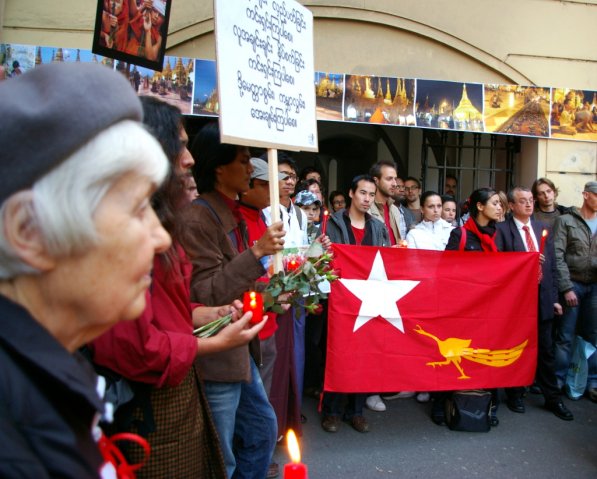A Transparent Pivot
 The U.S. has S.E. Asia in its sights.
The U.S. has S.E. Asia in its sights.
A few months ago, Secretary of Defense Leon Panetta made waves with his declaration of the United States' new naval "strategic pivot" from the Middle East to Southeast Asia. By 2020, the US aims to have the bulk of its navy in the Pacific, up from the current 50-50 split with forces in the Atlantic. Clearly the US powers-that-be think that a little more firepower should be in the neighborhood in case China decides to flex.
Of course, this announcement quickly became lost in the sea of election related headlines.
Now Barack Obama is to be our president for a second term. This week, Obama will become the first president in history to visit Burma/Myanmar, with Secretary of State Hillary Clinton in tow.
The stated purpose of the trip is to "extend a hand of friendship" to a country that is seemingly making lightning-paced reforms. The usual bromides about democracy, the right to assemble, the freeing of political dissidents, etcetera, etcetera have abounded. Remember the strategic pivot, though? Now that he's been reelected, Obama seems to be unabashedly sacrificing principles for pragmatism, and this is troubling.
Virtually overnight, Myanmar went from global pariah state to the West's golden boy of reform. At first, I bought into all of the media talking of a Gorbachev-style loosening in the country, which has been under military rule for the last half century. The speed at which this sudden detente has unfolded, though, makes me suspicious. All of the hoopla surrounding Myanmar's historic loosening conveniently fell around the same time that the U.S. expressed that it wanted to make inroads in the region.
In fact, taking a closer look at Myanmar paints a far bleaker picture. In recent months, the northwestern state of Araka has been marred by violence. The local Muslim population, the Rohingya, has been ruthlessly persecuted by the Buddhist majority, with government security forces often complicit in the violence. The Rohingya have been systematically disenfranchised by the state for years, and were even formally stripped of citizenship in the 1980s, despite long having since lived in present-day Araka. What's more, the military junta that runs Myanmar has been waging war against at least a dozen ethnic groups for the last few decades. Of course, all of the bloodshed has been conspicuously absent from the discourse.
I don't think the leader of the Free World -- particularly on his first postelection trip -- should prioritize getting buddy-buddy with the leaders of one of the most oppressive regimes in history. Of course China's shadow looms large in the region, but we shouldn't suddenly throw in the towel and trumpet an unflinchingly autocratic regime. Basic human rights should not be subverted on a massive scale for the sake of profit and a questionable strategic realignment.
Of course, none of this will ever come to the foreground. Western telecom giants will no doubt soon flock to Burma, which has the second lowest rate of mobile phone penetration (after -- surprise -- North Korea), and mining multinationals will gobble up the country's natural resources. And, besides, reporters don't seem to care about Obama's historic trip and its implications -- even upon arrival, the president still had to field questions about the rapidly escalating situation in Gaza. So much for the strategic pivot, anyway.
